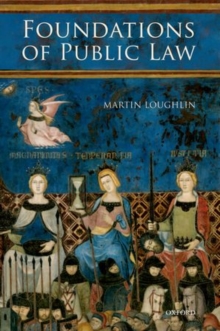Description
| Product ID: | 9780199669462 |
| Product Form: | Paperback / softback |
| Country of Manufacture: | GB |
| Title: | Foundations of Public Law |
| Authors: | Author: Martin Loughlin |
| Page Count: | 528 |
| Subjects: | Political science and theory, Political science & theory, Constitution: government and the state, Methods, theory and philosophy of law, Constitutional and administrative law: general, Constitution: government & the state, Jurisprudence & philosophy of law, Constitutional & administrative law |
| Description: | Select Guide Rating This book develops Martin Loughlin's distinctive and provocative theory of public law, first outlined in The Idea of Public Law. Tracing the historical evolution of the concept of public law, the book rethinks the foundational concepts of state, constitution, and government, arguing that public power is created, not controlled, by law. Foundations of Public Law offers an account of the formation of the discipline of public law with a view to identifying its essential character, explaining its particular modes of operation, and specifying its unique task. Building on the framework first outlined in The Idea of Public Law (OUP, 2003), the book conceives public law broadly as a type of law that comes into existence as a consequence of the secularization, rationalization, and positivization of the medieval idea of fundamental law. Formed as a result of the changes that give birth to the modern state, public law establishes the authority and legitimacy of modern governmental ordering.Public law today is a universal phenomenon, but its origins are European. Part I of the book examines the conditions of its formation, showing how much the concept borrowed from the refined debates of medieval jurists. Part II then examines the nature of public law. Drawing on a line of juristic inquiry that developed from the late sixteenth to the early nineteenth centuries - extending from Bodin, Althusius, Lipsius, Grotius, Hobbes, Spinoza, Locke, and Pufendorf to the later works of Montesquieu, Rousseau, Kant, Fichte, Smith, and Hegel - it presents an account of public law as a special type of political reason.The remaining three Parts unpack the core elements of this concept: state, constitution, and government. By taking this broad approach to the subject, Loughlin shows how, rather than being viewed as a limitation on power, law is better conceived as a means by which public power is generated. And by explaining the way that these core elements of state, constitution, and government were shaped respectively by the technological, bourgeois, and disciplinary revolutions of the sixteenth century through to the nineteenth century, he reveals a concept of public law of considerable ambiguity, complexity, and resilience. |
| Imprint Name: | Oxford University Press |
| Publisher Name: | Oxford University Press |
| Country of Publication: | GB |
| Publishing Date: | 2012-09-27 |


